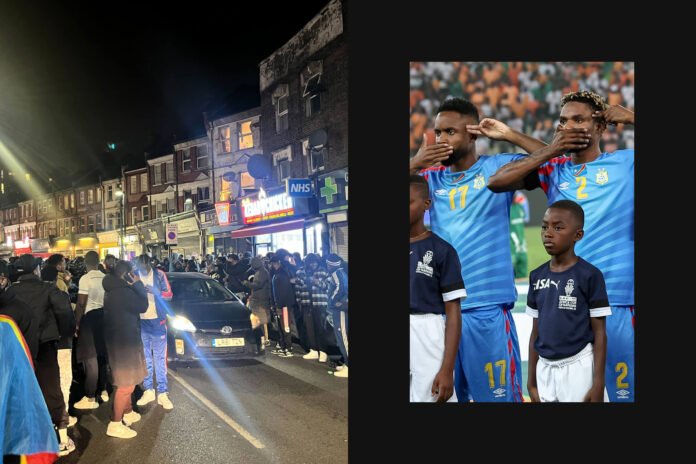An hour before kick-off, north London’s Belle Congolaise is already packed with DR Congo football fans kitted out in replica jerseys and waving their national flag.
The restaurant is on West Green Road, a bustling, noisy and densely packed street home to a row of African restaurants, bars and bakeries. This lively part of the city is also where thousands of Congolese in the UK reside.
They are gathered for their Africa Cup of Nations semi-final against hosts Ivory Coast. It is a clash of the unconvincing in Abidjan: two teams who have stuttered and spluttered to reach this stage.
Ivory Coast sacked their manager, Jean-Louis Gasset, in the group stage after a 4-0 loss to Equatorial Guinea, while DR Congo didn’t win a match in normal time until the quarter-final (a 3-1 win over Guinea). Before beating Guinea, DR Congo beat Egypt in a shootout in the round of 16 after drawing their three group matches to squeeze through to the knockouts.
Ahead of the game, there is talk of 1974, the last year DR Congo won AFCON, as fans secretly dare to dream of lifting the trophy again 50 years later. That same year, as Zaire, they also became the first sub-Saharan African side to qualify for the World Cup. Muhammad Ali also fought George Foreman in the nation in 1974 in what became known as the ‘Rumble in the Jungle’. It was not their first AFCON title: they won it in 1968 too.
This year’s tournament feels like a chance to return to former glories.
Whoever you speak to here feels great pride at what the class of 2024 have achieved. That’s because the match carries extra meaning for the DR Congo.
Their success in the tournament has provided a much-needed platform to shine a light on one of the most troubled countries on the continent. Violence in the mineral-rich east of the country, including a long-running conflict between M23 rebels and government troops, has forced millions of people to flee their homes. The United Nations say the DR Congo is facing one of the “largest humanitarian crises in the world” while it was ranked 186th out of 189 countries by the International Monetary Fund (IMF) for GDP per capita.
People flee their homes in DR Congo due to the conflict (Alexis Huguet/AFP via Getty Images)
Football, then, has offered an escape from that unrest and instability.
Before the match, Benik Afobe, who was born in London but who played for DR Congo, tells The Athletic: “It’s a difficult situation with what’s going on in the east of the country at the moment. It’s putting a downer on the country, so this is the one thing that brings everyone together. It takes people’s minds away from all the negativity.
“In DR Congo, they love football. Playing for DR Congo was nothing like I’ve experienced before. When you go to the stadiums, even at training, the looks that are on the faces of the men, women and kids is amazing.”
During the national anthems, the DR Congo players covered their mouths and pointed their fingers to their heads.
After the match, Sebastien Desabre, the DR Congo’s French head coach, says: “This was a message to victims in the eastern region of the Congo. We need to highlight it and our players are disappointed about this, for all the Congolese we would have wished to give them a smile tonight but we did our best. A national team is a driver for the nation’s pride. Tonight it was our duty to share this moment with them.”
In Belle Congolaise, there’s a real sense of community and togetherness. There are hugs, handclaps and fans reunited. One fan is wearing a T-shirt saying, ‘Stop the killing in Goma (in the east of Congo).’ It’s so busy that no one can get in or out and fans have lined the street outside the restaurant.
“It’s so important because the country has been divided for quite some time,” Tresor Image says. “The only thing that unites everybody is football.”
Another fan, James, adds: “It means a boost of hope in a positive direction.”
There’s a roar as the match gets underway and an even bigger cheer when it looks as if DR Congo have taken an early lead, only for the referee to blow for a foul. Midway through the first half, there’s uproar as all the TV screens go blank for a few minutes.

Watching the game on Wednesday night (Tom Burrows/The Athletic)
After a cagey first half, DR Congo have a big chance to go ahead early in the second half but Theo Bongonda flashes his shot wide. As the game progresses, Ivory Coast turn the screw and Sebastien Haller loops a scruffy volley over Lionel Mpasi.
“How did that go in?” groans a crestfallen fan behind me.
The game ends without DR Congo really landing a punch. As we get ready to leave Belle Congolaise, it’s all too much for one supporter, who sits at his table sobbing into his flag.
Back out on West Green Road, there are hundreds of Congo fans — but sadly no repeat of the crazy celebrations that followed their quarter-final victory.
However, there are still grounds for optimism. “We didn’t even qualify for AFCON in 2021, so we are improving,” Emmanuel says as we walk back to Seven Sisters tube.
And James says: “I feel like we’ve won already with how we’ve done, it’s been a success and I hope this inspires the next generation.”
So the 50-year wait for DR Congo goes on. But this thrilling ride has given them a reason to dream again.
(Top photo: Franck Fife/AFP via Getty Images/Tom Burrows)
Read the full article here


